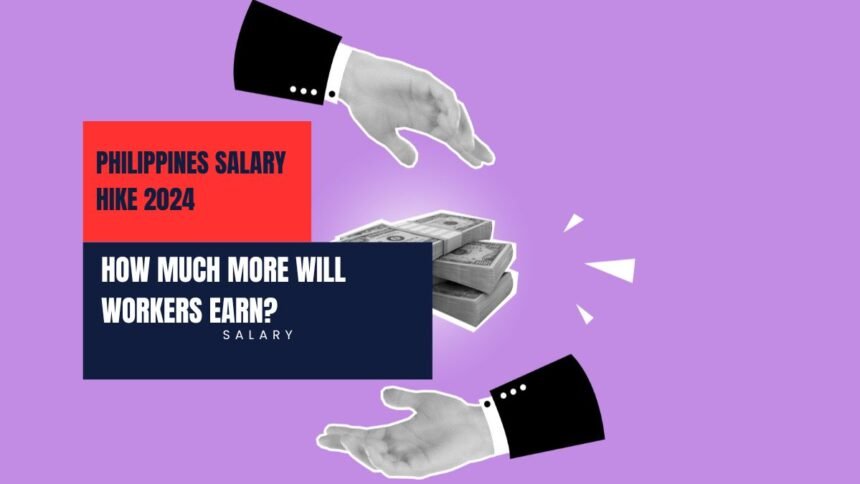The Philippines is gearing up for a significant change in July 2024: a nationwide salary increase for workers. This is a big step aimed at helping Filipino workers deal with rising living costs and inflation. The salary hike results from efforts by labor groups and government policies to improve the standard of living for everyone. In this article, we’ll look at the details of this salary increase, why it’s happening, and how it will affect different sectors and the broader economy.
Philippines Salary Increase July 2024
The Department of Labor and Employment (DOLE) in the Philippines has announced a salary increase that will start in July 2024. This increase will differ by region to reflect the cost of living in different areas. On average, workers will see a pay raise of 5% to 10%, depending on their location and industry.
Here’s a table summarizing the key details of the salary increase:
| Region | Current Minimum Wage (PHP) | New Minimum Wage (PHP) | Percentage Increase |
|---|---|---|---|
| National Capital Region (NCR) | 570 | 627 | 10% |
| Other Urban Areas | Varies | +5% to 8% increase | 5-8% |
| Rural and Less Urbanized Regions | Varies | +5% increase | 5% |
For example, workers in the National Capital Region (NCR), where the cost of living is higher, will get a bigger raise. The minimum wage in the NCR will go up from PHP 570 to PHP 627, which is about a 10% increase. In areas with lower living costs, the wage increase will be smaller but still significant.
Rationale Behind the Salary Increase
Several reasons have led to this salary increase:
- Inflation and Cost of Living: The Philippines has experienced rising inflation, which reduces the buying power of workers. The salary increase aims to help workers cope with these higher costs and maintain their living standards.
- Economic Growth: The country’s economy has been recovering and growing after the pandemic, especially in sectors like manufacturing, services, and technology. The increased productivity in these areas makes it possible to raise wages.
- Social Equity: The government wants to reduce the gap between the rich and the poor. By raising wages, they aim to distribute economic benefits more fairly across different social classes.
- Labor Advocacy: Labor groups have been pushing for higher wages, arguing that workers need more money to cover their basic needs. Their efforts have pressured the government to act.
Sector-Specific Impacts
The salary increase will affect different sectors in various ways:
- Manufacturing and Industry: Workers in manufacturing, a key part of the economy, will benefit from higher wages. This boost is expected to improve worker morale and productivity, leading to better industrial output.
- Service Sector: Employees in sectors like retail, hospitality, and customer service will see wage increases. Since many people work in these fields, the pay raise could lead to more consumer spending, boosting the economy.
- Agriculture: Though the agricultural sector has its challenges, the wage increase will support rural workers and help reduce poverty in these areas. Higher incomes could stimulate local economies.
- Technology and BPO: The technology and Business Process Outsourcing (BPO) sectors are growing rapidly in the Philippines. The wage hike will help attract and retain skilled workers, keeping the Philippines a top choice for BPO services.
Broader Economic and Social Implications
The salary increase is expected to have several positive effects on the economy and society:
- Increased Consumer Spending: With higher wages, workers will have more money to spend, which can drive demand for goods and services. This increased spending could stimulate economic growth.
- Poverty Reduction: Raising the minimum wage is part of the government’s strategy to reduce poverty. Higher incomes will help workers afford better healthcare, education, and housing, improving their quality of life.
- Labor Market Changes: The wage hike might lead employers to seek more skilled workers to justify the higher pay. This could encourage employees to improve their skills and qualifications.
- Inflation Control: While raising wages could lead to inflation, the government will likely take steps to manage this risk and keep the economy stable.
Challenges and Considerations
While the salary increase is good news, it also presents some challenges:
- Higher Business Costs: Small and medium-sized businesses might struggle to handle the higher labor costs. The government may need to offer support to help these businesses adjust.
- Inflation Risks: Balancing wage increases with inflation control will be crucial. The government will need to watch the economy closely to prevent prices from rising too fast.
- Smooth Implementation: Successfully applying the wage increase across all regions and sectors will require careful coordination between the government, employers, and labor groups.
Conclusion
The planned salary increase in the Philippines in July 2024 is a major step forward in improving the lives of workers. It aims to address rising living costs, inflation, and income inequality, while also supporting economic growth. As the Philippines moves forward, cooperation between the government, businesses, and workers will be key to ensuring that everyone benefits from this positive change, creating a more balanced and prosperous society.
FAQ’s
What is the salary increase in the Philippines for July 2024?
The Department of Labor and Employment (DOLE) announced a salary increase for July 2024. The increase will vary by region, with a 10% raise in the National Capital Region (NCR) and a 5% to 8% raise in other areas.
Who will benefit from the salary increase in the Philippines?
The salary increase will benefit workers across various sectors, including manufacturing, services, agriculture, and technology. The amount of the increase will depend on the region and the cost of living in that area.
Why is the salary increase being implemented in July 2024?
The salary increase is being implemented to help workers cope with rising inflation and living costs, support economic growth, and reduce income inequality. It is also a response to advocacy from labor groups for higher wages.





